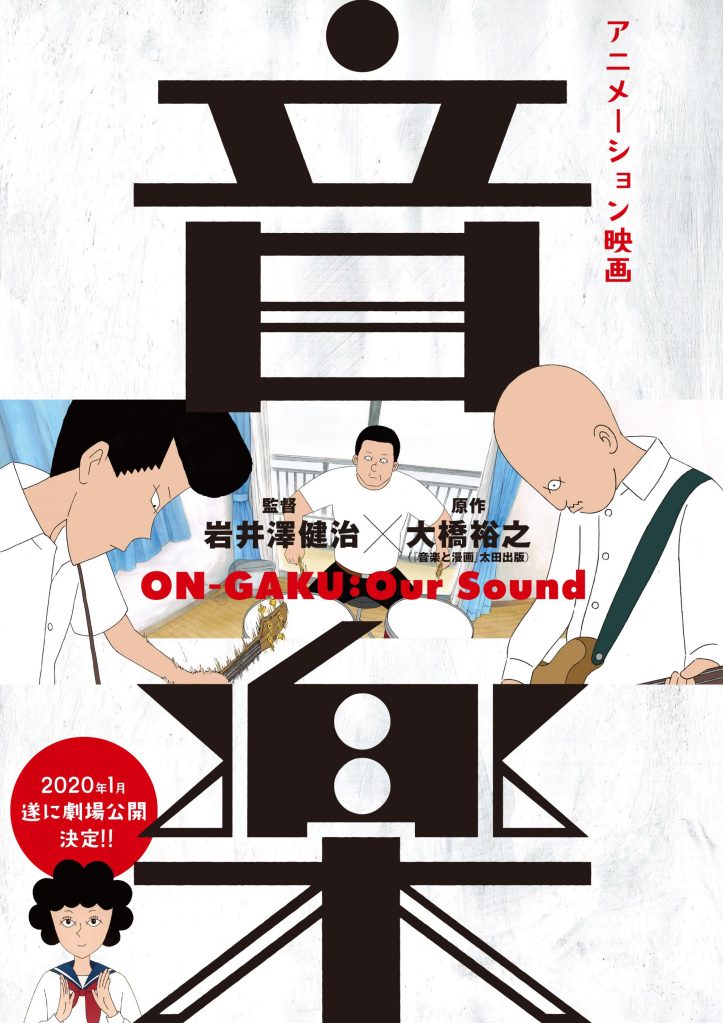
The high school band movie has a special place in Japanese cinema. From the anxious release of Linda Linda Linda to the laidback charms of K-On, music is that rare thing that both brings people together and enables individual expression. Adapted from the cult manga by Hiroyuki Ohashi, Kenji Iwaisawa’s highly stylised indie animation On-Gaku: Our Sound (音楽, Ongaku) is a psychedelic ode to the transportive qualities of musical performance from either side of the stage as its laconic, tongue-tied heroes rediscover themselves through the art of song.
Kenji (Shintaro Sakamoto) is perhaps the archetypal hero of another kind of manga, a shaven-headed delinquent stepping straight out of the pages of Crows Zero or a hundred other tales of high school hierarchies mediated through male violence. Known for his “spaghetti fist”, the monosyllabic young man is feared all around town as a ruthless fighter, engaging in petty acts of aggression with boys from neighbouring high schools, such as the mohawked Oba (Naoto Takenaka) and his identically dressed gang of young toughs who seem to be his current nemesis.
Lost in his own little world, Kenji barely notices when he finds himself in the middle of a crime scene as a thief runs past him on the street pursued by a heroic young man who, temporarily liberating himself, thrusts the guitar he is carrying into Kenji’s arms. Bemused by the chaotic scene in front of him, Kenji becomes fascinated by the strange instrument and immediately announces to his two friends, Ota (Tomoya Maeno) and Asakura (Tateto Serizawa), that they’ll be forming a band, picking up everything they need from the school music room and cheerfully walking off with it. Of course, they have no idea what instruments even are let alone how to play them but then that hardly matters, or as Kenji puts it might just be the “whole point”.
Asakura comes up with a name for their musical trio, “Kobujutsu”, without quite knowing what it means (classical martial arts), later realising they have a problem because there’s already a similarly named band at school, Kobijutsu (classical fine arts). Asakura has the idea to strong-arm the other guys into changing their monicker, but in place of the expected battle of the bands the two sets of unlikely allies find unexpected common ground in musical appreciation. Kobijutsu, led by introverted music geek Morita (Kami Hiraiwa), is an old school retro folk trio, while Kenji & co are unrefined, avant-garde punk rockers, but each discovers something in the other that speaks directly to them in mutual understanding as “musicians”.
In fact, “musicians” is how Kenji demands to be identified, explaining to the gang’s female friend Aya (Ren Komai) who was used to referring to them as the “three musketeers”, that they’re “now obsessed with music” which is why they “don’t have time” to go fight Oba. But Kenji later finds himself depressed, declaring himself “bored” with the band much to the alarm of his two friends who’ve fully embraced their artistic sides. The young men find themselves literally transported by music, Morita seeing himself in a surrealistic scene surrounded by artefacts of misremembered traditional culture pointing to unexpected angles in Kenji’s raw musical expression which later manifest themselves in an unexpected sight gag as he reveals a different side to himself in a musical register which is both refined and naive, while Morita too begins to embrace his inner rebel with psychedelic glee complete with a fresh new look.
Iwaisawa spent seven years on the project drawing over 40,000 images by hand largely on his own. His designs perfectly mimic the quirky minimalism of Ohashi’s manga, complete with a lowkey deadpan sensibility that is perfectly in tune with the laidback charms of its slacker heroes. Kenji lives in a slightly different temporality, his extended pauses before offering up his idiosyncratically concise replies rendered as perfectly timed still frames while the musical sequences are filled with the raw anarchic energy of something being set free as the youngsters liberate themselves through the joy of music, climaxing in a rotoscoped final concert which unites all in a shared sense of transcendental transformation. Boasting an expertly crafted, nostalgic soundtrack, Iwaisawa’s joyful celebration of the power of making music is an off-beat gem.
On-Gaku: Our Sound is available to stream in the US until July 30 as part of this year’s Japan Cuts.
International trailer (English subtitles)
